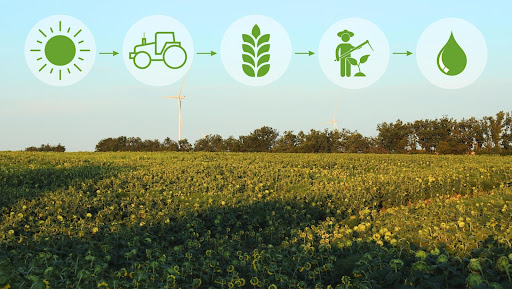Organic farming is experiencing a fundamental shift with the integration of new technologies. As consumer demand for organic produce grows, farmers are discovering new organic farming technologies that improve efficiency, increase yields, and sustainably maintain the practice. These innovations make organic farming more productive and ensure crops meet the high standards of environmental stewardship, soil health, and biodiversity defining organic agriculture.
This blog discusses the new technologies in organic farming from robotics to climate- smart solutions that are changing how the future of sustainable agriculture will be shaped.
Overview To Technologies Innovation In Organic Agriculture
The adaptation to modern agriculture technology in India has enabled many farmers to produce more output while remaining within the confines of organic farming principles. Organic farming was originally focused on the use of natural methods; however, the current farmer incorporates both practices with modern technology. Examples of such technologies are automation tools such as robotics, drones that can provide real-time monitoring, and AI-based systems that provide precision insights. These advancements have streamlined the process, made better data-driven decisions, and minimized labor.
New technologies in organic farming are reducing environmental impacts, conserving resources, and keeping crops free from synthetic inputs. As these new methods are being introduced, organic agriculture is changing to meet the global food market demands sustainably.
Key Technological Innovations: Robotics, Drones, and Automated Machinery
Some of the most important technological advancements that are making an impact in the world of organic farming include:
- Robotics: Organic farms employ robots to plant, weed, and harvest. The machines can work for a long time, repeat tasks with precision, and save on human labor. Robotics also saves on soil compaction since it allows smaller and lighter machinery.
- Drones: Checking the crop health through drones is a low-cost and handling vast farmland can also be done with the aid of drones. The captured high-resolution images by means of drones help farmers decide the health status of plants and track their growth at an early stage; spot infestation by pests, diseases, and so forth. Thus, instant data provided allows for making instant decisions.
- Automated Machinery: Machines are fitted with GPS and AI capabilities. Thus, by accurate application of water, organic manures, and pesticides is possible with the usage of tractors. By providing automation to machinery, improves efficiency in terms of use, reduces wastage of waste, and resources efficiently get utilized.
There are also Climate Smart Agriculture Technique as climate resilience is vital in organic farming, and smart agriculture technologies help farmers adapt to weather changes. Techniques like controlled-environment agriculture and drip irrigation ensure crops grow optimally despite changing climate conditions.
How Technologies are Helping in Organic Farming
Technology holds a transformational role in organic farming, especially in respect of overcoming the challenges particular to this method. For instance, with new technology in organic farming, one can have:
- Improve Crop Quality and Yields: Precision farming and data analytics allow farmers to closely monitor the needs of the crops, ensuring healthy growth and producing better yields without sacrificing organic standards.
- Save Resources: Precision tools help save water, fertilizers, and energy. For example, automated irrigation systems ensure only the right amount of water reaches the crops, conserving this precious resource.
- Improvement in soil health: With specific types of soil management, organic manure can be used in its full potential. The organic fertilizers increase soil productivity while reducing soil erosion.
- Controlling Pests: It is through technology that drones combined with AI will sense these pests, and farmers through this will apply organic repellent methods to reduce pest in the shortest time using organic manure rather than applying chemical fertilizers.
Challenges and Solutions
This integration of technology and organic farming has many advantages associated with it. Still, at the same time, there are some disadvantages.
- High up-front investment: Many of these technologies are quite expensive up front. Government incentives and co-funding will help relieve some of that burden.
- Technical know-how: Scarcity of technical expertise. Special skills are often required for the proper handling of some equipment. The availability of special training programs and supporting systems can aid in facilitating the adoption process.
- Maintaining Organic Standards: Technology use must be in accordance with organic standards. Innovations should complement natural processes.
However, solutions such as community-based training and financing options are helping farmers adopt technology sustainably.
FAQs Related to New Innovations in Organic Farming
Q1: What are some examples of modern agriculture technology in India that align with organic farming?
A1: Examples include drones for crop monitoring, automated machinery for precision planting, and IoT sensors that monitor soil health, helping farmers practice organic farming more efficiently.
Q2: How do climate smart agriculture techniques benefit organic farming?
A2: Climate-smart techniques help organic farmers adapt to weather variability, manage resources better, and minimize greenhouse gas emissions, supporting both productivity and environmental resilience.
Q3: Are there specific technologies designed exclusively for organic farming?
A3: While some technologies, like certain organic pest control robots, cater specifically to organic farms, most innovations in robotics, IoT, and data analytics can be adapted for organic practices.
Organic farming is undergoing an exciting evolution with technology, making it more viable and productive for the long term. ASQI is at the forefront, helping farmers adopt these new technologies in organic farming to advance sustainable agriculture for a healthier planet.







